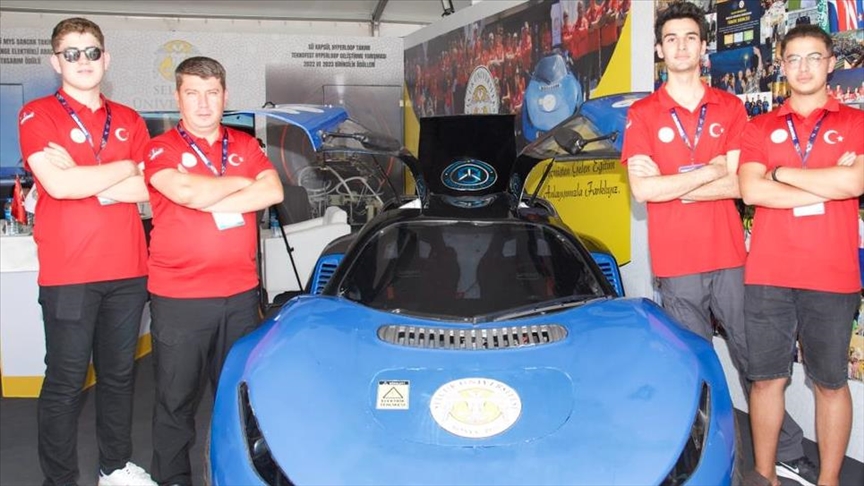ANKARA
As Türkiye’s premier technology and aerospace event TEKNOFEST approaches its last day, the hydrogen-powered cars designed by university students have piqued the interest of visitors.
Hydromobile cars that harness the power of hydrogen are more efficient and cleaner than vehicles that rely on conventional internal combustion engines, as they generate electricity by utilizing electrochemical reactions, which leave no harmful emissions behind.
Universities invest heavily in hydrogen-powered cars, as Türkiye has pledged to reach a net-zero emission target by 2053.
TEKNOFEST, of which Anadolu is the global communications partner, provides universities with opportunities to showcase these projects, which are playing a key role in the country’s adoption of green technologies.
Of the 60 electric cars competing in the “International Efficiency Challenge Electric Vehicle” race, 10 are powered by hydrogen.
The race aims to increase awareness about the use of alternative and clean energy sources in the automotive industry and encourage students to follow related technological developments.
According to Hakan Terzioglu, an assistant professor at Selcuk University’s electrical engineering department, students’ hydrogen-powered vehicle projects are of “critical importance.”
These projects “will promote the use of hydrogen technology in electric cars at a time when countries are trying to wean themselves off fossil fuels such as oil and natural gas,” Terzioglu told Anadolu.
Noting that the use of hydrogen fuel is set to increase in the next five years, Terzioglu stressed that hydrogen represents one of the cleanest and cheapest forms of fuel.
“During the first years of TEKNOFEST, unmanned aerial vehicles designed by our students were at the forefront,” Terzioglu said, pointing to the TEKNOFEST’s significance in the success story of Turkish company Baykar, a major designer and manufacturer of drones.
The company signed an agreement with Saudi Arabia in July to provide its Bayraktar Akinci unmanned combat aerial vehicles. The deal is Türkiye’s largest defense and aviation export agreement with Riyadh in its history.
“Considering that the majority of students working at Baykar have once participated in TEKNOFEST projects, we hope that TEKNOFEST will also contribute in the growth of our students designing hydrogen vehicles,” he added.
Hydrogen is ‘the fuel of the future’
Veli Celik, the dean of Ankara Yildirim Beyazit University’s aviation and space sciences faculty, said his students participated in TEKNOFEST with an electric car project this year, but will participate with a hydrogen vehicle next year.
“Hydrogen is a clean energy because when it burns, it does not emit harmful substances into the environment and produces water rather than greenhouse gases,” Celik explained, describing hydrogen as “the fuel of the future.”
Enes Musa Gucluturk, a fourth-year student of Ankara University’s Electrical Engineering Department, took part in TEKNOFEST with his hydrogen car “TURAZ-U1.”
Since hydrogen technology has not yet been completely explored, Gucluturk said several universities are doing research and development studies on the utilization of hydrogen.
Gucluturk, a member of the Hidroket, a group that aims to produce a vehicle powered by hydrogen energy, also represents his university as a captain for the “International Efficiency Challenge Electric Vehicle” race.

